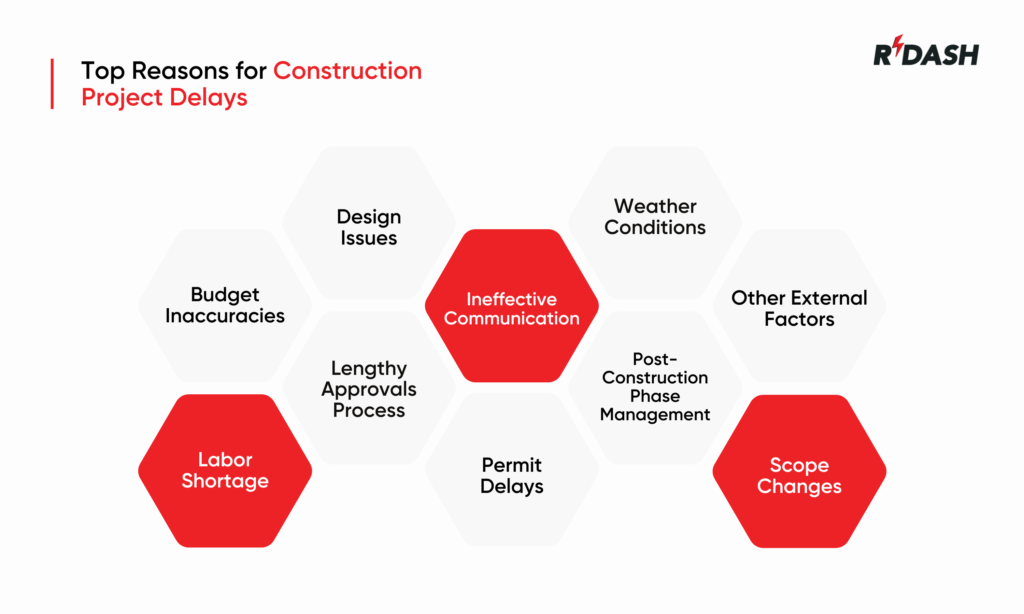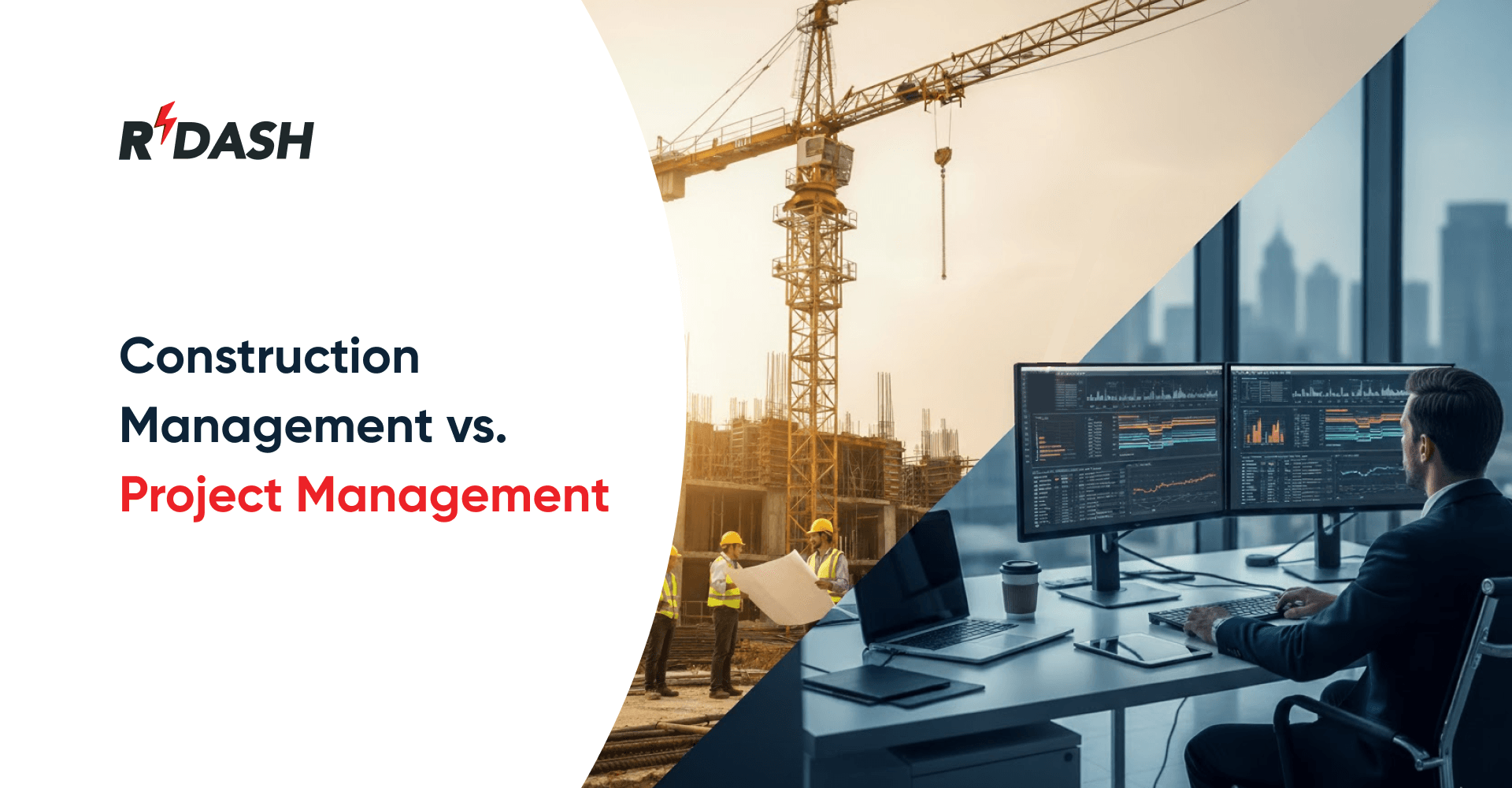What are construction project delays?
In construction, a project delay happens when the project fails to finish within the established timeline. Delays can happen at any stage of the project, from planning to construction, and they can be caused by various factors. Construction delays are a common challenge in the industry, and they can lead to increased costs, missed deadlines, and unhappy clients. Understanding the causes of these delays can help construction teams and project managers prevent them or at least reduce their impact.
What causes construction project delays?
Various factors can lead to delays in construction projects. Here are the most common causes:

1. Labor Shortage
A major cause of delays is a shortage of skilled labor. Construction projects require professionals like electricians, plumbers, carpenters, and general laborers. If there aren’t enough workers available or if workers lack the necessary skills, it can slow down the pace of construction. A shortage of labor can occur due to a variety of reasons, including economic conditions, worker strikes, or simply a lack of qualified workers in the area.
2. Budget Inaccuracies
Sometimes, construction projects experience delays because the project’s budget was inaccurately estimated. If the initial budget is too low, the project may run out of funds before completion, halting progress until more money is available. This situation can lead to a revised budget and a delay in reaching certain project milestones. On the other hand, unexpected costs or overspending can also delay the work as additional funding or resources are needed.
3. Lengthy Approvals Process
The approval process for permits, inspections, or changes in the design can take longer than expected. If required approvals from local authorities are delayed, construction can’t proceed as planned. These delays can happen due to bureaucratic processes, changes in regulations, or slow responses from government agencies. A lengthy approval process can put the entire project timeline at risk.
4. Design Issues
Design-related issues during the planning or building stages can also result in delays. Sometimes, the project’s design may not be practical, leading to necessary changes or revisions. This can cause delays as the construction team has to adjust the plans, reorder materials, or wait for approval of the new design. Misunderstandings or a lack of clear communication about the design can also lead to mistakes that need to be corrected.
5. Lack of Effective Communication
Effective communication and coordination are crucial for the success of any construction project. When there’s poor communication between the different teams involved (e.g., architects, engineers, contractors, and subcontractors), it can cause confusion, delays, and mistakes. Ineffective coordination may result in tasks being done out of order, duplication of efforts, or workers waiting for instructions, which can halt progress.
6. Permit Delays
Permit delays are a common issue in construction. Before starting certain types of work, construction projects often require permits from local authorities. The time required to secure these permits can often exceed initial expectations. If permits are delayed, it prevents the team from moving forward with the planned work. This is particularly problematic when specific permits are needed for critical activities such as excavation, electrical work, or plumbing.
7. Weather Conditions
Weather conditions are another unpredictable cause of construction delays. For example, heavy rain, snow, or extreme temperatures can prevent workers from being able to carry out certain tasks. Unfavorable weather can slow down outdoor work like concrete pouring, roofing, or excavation. Poor weather can also cause safety concerns on the job site, leading to a temporary halt in activities until conditions improve.
8. Post-Construction Phase Management
Delays don’t only happen during the construction phase; they can also occur during the post-construction phase. After the building is completed, additional time may be needed for final inspections, touch-ups, or obtaining occupancy certificates. Delays in these final steps can push back the overall project completion date. Poor post-construction management can lead to unfinished tasks or unresolved issues that delay project handover.
9. Scope Changes
One of the leading causes of delays in construction projects is scope changes. Throughout the project, clients may request alterations to the design, features, or specifications. These changes can add extra time to the schedule, as new plans need to be created, materials need to be reordered, or additional work needs to be done. Unplanned scope changes can disrupt the workflow and extend the overall project timeline.
10. Other External Factors
Natural disasters can severely affect construction projects. Earthquakes, floods, hurricanes, or other natural events can damage the work already completed, halt progress, and cause long-term delays. These events are usually unavoidable and may require the rebuilding of parts of the project. Dealing with the aftermath of natural disasters often involves waiting for recovery, assessing damage, and making necessary repairs, all of which take time.
How RDash can help prevent delays in your construction projects
Construction project delays are a common issue that can cause budget overruns and frustration for all parties involved. Timely completion of a project is crucial, but many factors can contribute to delays. Luckily, RDash provides effective tools that can help avoid these delays and keep your construction project moving forward. By improving document management, streamlining the activity schedule, and enabling real-time collaboration, RDash enhances project efficiency and reduces the likelihood of delays.
Document Management
One of the biggest causes of project delays is poor document management. In construction, there are numerous documents to keep track of, from contracts and blueprints to permits and invoices. Missing or misplaced documents can cause confusion, lead to errors, and delay approvals or the start of work.
With RDash’s document management system, all project documents are stored in one centralized, easy-to-access location. RDash allows team members to upload, organize, and share important documents in real-time, reducing the chances of lost paperwork. It also ensures that everyone is working from the most up-to-date version of documents, helping to avoid costly mistakes and delays.
By using RDash’s document management feature, project managers and team members can quickly access and review critical project information, keeping everything organized and accessible at all times. This ensures that approvals, permits, and other essential documents are handled promptly, minimizing delays in the process.
Activity Schedule
Effective project management relies heavily on keeping the schedule organized. Delays often happen when tasks are not properly scheduled, resources are not allocated effectively, or there’s confusion about what needs to be done next. RDash’s activity schedule module helps prevent these issues by breaking the project into manageable tasks and assigning deadlines to each.
With the activity schedule module, project managers can:
- Track each task’s progress and completion status.
- Adjust schedules in real-time if delays occur or new tasks need to be added.
- Assign responsibilities to the right team members based on their availability and skills.
By having a clear, organized activity schedule in RDash, construction teams can stay focused on the right tasks at the right time. This level of organization helps prevent overlapping tasks, missed deadlines, and idle workers, all of which can contribute to delays. Additionally, the flexibility to make quick adjustments ensures that any setbacks can be managed before they turn into bigger problems.
Real-Time Collaboration
Ineffective communication and lack of coordination are often at the root of construction project delays. When team members are working in silos or not sharing timely updates, issues can snowball and slow down the project. RDash allows all stakeholders to work together efficiently and stay on the same page, no matter where they are.
With RDash, project managers, contractors, and subcontractors can:
- Share updates instantly on task status or issues.
- Discuss changes in design or scope without waiting for scheduled meetings.
- Track project milestones in real-time to ensure no part of the project is falling behind.
It ensures that everyone involved in the project has up-to-date information and can make quick decisions. Whether it’s a quick question about a task or a design change that requires immediate attention, RDash allows communication to flow smoothly and efficiently, reducing the chances of delays caused by miscommunication or information gaps.






